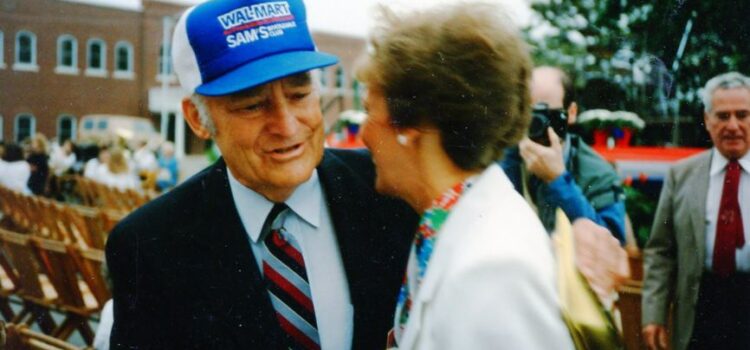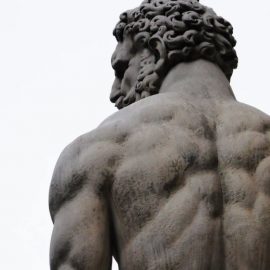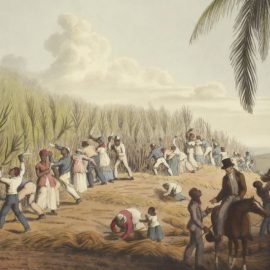

This article is an excerpt from the Shortform book guide to "Sam Walton: Made in America" by Sam Walton. Shortform has the world's best summaries and analyses of books you should be reading.
Like this article? Sign up for a free trial here .
Who was Sam Walton? What were Sam Walton’s defining personality traits?
Sam Walton founded “The Walton Five and Dime” in 1970 which eventually turned into Wal-Mart. Walton’s personality was one of the major contributing factors to the growth of Wal-Mart.
Continue reading if you want to know who Sam Walton was and how he came to found Wal-Mart.
Who Was Sam Walton?
In his autobiography, Sam Walton demonstrates the character traits that enabled him to build Wal-Mart into a titan. Here are the major themes that made up who Sam Walton was:
- Competitiveness: Walton always had conviction that he would win. The idea of beating his competition fueled him.
- Boldness and Optimism: Many predicted that Walton’s strategy would fail. He stayed committed and optimistic that he would win, even in major setbacks.
- Frugality: Wal-Mart existed to save customers money. Using money needlessly meant taking money out of customers’ pockets.
- Knowing his Weaknesses: Walton openly admitted weaknesses in himself and his company, such as lack of formal operations.
- Humility: Walton never believed he was smarter than Wal-Mart employees. He eagerly learned from everyone he could, including store greeters.
Competitiveness
Walton noted: “If I had to single out one element in my life that has made a difference, it would be a passion to compete.” His brother Bud Walton noted, “He knew he was going to win. It’s just the makeup of the man.”
Walton was competitive even in early childhood:
- As a child he bet other Boy Scouts who would be first to reach Eagle (he won).
- In high school, he led the basketball teams and football teams to be undefeated state champions
- In college, he became president of his senior class, president of the senior men’s honor society, and president of the Burall Bible Class.
Competitiveness drove his start in retail. When starting his first Newport store, Walton set his 5-year goal: for his “little Newport store” to be the most profitable variety store in Arkansas.
His competition spurred him to keep doing better:
- In Newport, John Dunham’s Sterling Store across the street was his main competition. He studied his competitor’s pricing and goods incessantly and plotted how to beat them. When a large retail space opened up in town for leasing, he took it. He didn’t know what he was going to do with it, but he definitely didn’t want Sterling to have it.
- When discount stores were becoming a larger trend, Walton proposed creating discount stores to the Butler Brothers, the owner of the Ben Franklin franchise. They rejected the idea. Walton reflected, “I got a little angry, and maybe that helped me decide to swim upstream on my own.”
As a habit, Sam Walton constantly eyed the competition and borrowed the best ideas from them.
- He advised his staff, “Go in and check our competition. And don’t look for the bad. Look for the good. If you get one good idea, that’s one more than you went into the store with, and we must try to incorporate it into our company.”
- If other stores offered sales, he wanted his prices lower.
- This became such a habit that on family vacations outside town, he would visit stores to study their practices. His wife Helen commented, “Sam never went by a Kmart that he didn’t stop and look at it.”
- Sam was brazen enough to go directly to his competitors’ management, saying he had a small company in Arkansas, and ask strategic questions. Wal-Mart was too small to worry about in the beginning.
- Even outside retail, Walton picked up the idea of “associates,” morning calisthenics, and company cheers from other companies and cultures.
- He kept watch for new trends, like discount stores, and mega-size shopping centers, letting him be among the first in his area to pursue those opportunities. Wal-Mart itself as a discount retailer was an idea taken from earlier discounters. Sam’s Club, a warehouse sub-discounter, was taken from Price Club.
Competitors make each other better, and the customer gets the best value of all. Sam thanks Kmart for its competition in keeping them on their toes.
- He doesn’t buy the common assertion that Wal-Mart succeeded merely because no one else was paying attention to small towns. They had to compete against variety stores. Also, the rural customers weren’t stupid—if a store an hour away had better deals, they would go there.
- Later when Kmart attacked, they wouldn’t have survived if they weren’t amazing executors.
The competitiveness extends to how he treated vendors: Sam Walton forced all his vendors and suppliers to compete for Wal-Mart’s business, even if he liked them personally and knew they were good people.
Sam was also competitive in his hobbies quail hunting and tennis, never wanting to give up a point. He preferred tennis instead of golf because of its head-to-head nature.
His competitiveness prevented him from ever feeling Wal-Mart was doing enough. He would always point out things that could be improved, like the lines being too long or the store staff not being helpful enough. This kept him forever looking forward, to the next store opening, to the next walk through a Wal-Mart store.
Boldness/Optimism
Walton had a relentless optimism that he would succeed and things would work out.
Said David Glass, former CEO of Wal-Mart, “[Sam] is less afraid of being wrong than anyone I’ve ever known. And once he sees he’s wrong, he just shakes it off and heads in another direction.”
His optimism carried him through key events and major setbacks in his career:
- After leaving the Army in 1945, Walton knew he wanted to go into business for himself. Despite having only his JC Penney job as retail experience, he was confident he could succeed going into business.
- After his lease ran out, Walton lost the store that he’d spent 5 years building. He brushed it off: “I’ve never been one to dwell on reverses…you can make a positive out of most any negative if you work at it hard enough. I’ve always thought of problems as challenges, and this one wasn’t any different.”
- Walton faced early criticism for his small-town strategy, hearing that a town of less than 50,000 in population couldn’t support a discount store. Despite this, he persisted, driven in the idea of being the best store for the local population.
In the autobiography, Walton revealed his optimism and grit often:
- “It never occurred to me that I might lose; to me, it was almost as if I had a right to win. Thinking like that often seems to turn into sort of a self-fulfilling prophecy.”
- Walton saw the book as a story about “knowing where you want to go and being willing to do what it takes to get there…about believing in your idea when maybe some other folks don’t and sticking to your guns.”
- “Commit to your business. Believe in it more than anybody else…If you love your work, you’ll be out there every day trying to do it the best you possibly can, and pretty soon everybody around will catch the passion from you—like a fever.”
His one stated moment of weakness in the book was in 1976, with the “Saturday night massacre” that led to losing a third of senior management. Walton admitted, “I wasn’t sure myself that we could just keep on going like before.”
Frugality
Frugality was a central piece of how Walton lived his life and ran Wal-Mart.
Walton lived through the Great Depression and saw his father go between jobs. He also traveled with his father as a repossessor for a loan company. Through this, he learned the difficulty of earning a dollar, and thus the value of money. In turn, Walton funded himself through college with a small paper routes business and waited tables.
Frugality was part of the core of Wal-Mart. Walton believed that Wal-Mart existed to save customers money and provide quality and service. Any dollar spent inappropriately was money taken from their customers’ pockets. As a result, Wal-Mart hesitated to give fancy perks to employees—they put off buying a jet for management, and they forced employees to sleep two to a room when traveling.
Practically, Walton knew that if he could control expenses better than his competition, they would have an edge in pricing. For years, Wal-Mart had the lowest ratio of expenses to sales. Walton believed that operational efficiency gave them more strategic flexibility and more room to experiment and fail.
Even when expanding rapidly, Sam was careful not to overreach unless he had to:
- In the 1960s early days, he habitually turned down spending unnecessary money, like renting huge warehouses.
- He resisted investing in flashy technology. “It was important to me to make them think that maybe the technology wasn’t as good as they thought it was, or that maybe it really wasn’t the end-all they promised it would be.”
- If warehouse workers knew Sam was visiting and they had an extra tractor idling, they would hide it so Sam wouldn’t know they had anything running empty, lest he cut down on the warehouse’s resources.
Walton extended his values to his family, instilling the values of hard work, honesty, and thrift. Even when wealthy, the Waltons refused to spend lavishly.
- “I just don’t believe a big showy lifestyle is appropriate for anywhere, least of all here in Bentonville where folks work hard for their money and where we all know that everyone puts on their trousers one leg at a time.”
- His children worked in the stores and grew up not having much money (given that Sam reinvested in expanding stores).
- He only flew coach, knowing that if he flew in a different part of the plane as his associates, the resentment would inevitably begin.
- He bemoaned the press for focusing on their family’s wealth without being interested in Wal-Mart.
- Most of the family’s wealth was held in Wal-Mart stock, and he preferred to keep it that way. He observed that some family owners sold stock to live a rich life, but they ended up losing their ownership, and the company would be ruined by new management. He loved the company too much to quit this way.
Knowing His Weaknesses
Throughout his book, Walton is frank about his shortcomings and how his associates at Wal-Mart helped him with things he couldn’t do.
- Walton notes that he wasn’t a good negotiator, since he “lacked the ability to squeeze that last dollar.” For this, he relied on his brother Bud.
- Walton knew that early in Wal-Mart’s history, their back-office systems (for instance, in accounting and inventory) were terrible. But they made up for it by having the lowest possible costs, the variety of merchandise, and brand reputation.
- Funny story: instead of traditional LIFO/FIFO accounting, Walton notes they used “ESP” accounting—meaning if the books didn’t line up, they added an entry for “Error Some Place.”
- Walton recognized that he tended to slack in some areas, so he surrounded himself with people who were good at things he wasn’t. These included systems, operations, and distribution.
Friendliness
Walton had a natural charisma through his friendliness. Said a co-worker, “Walton just had a personality that drew people in. He would yell at you from a block away…that’s the reason so many liked him and did business in the store. It was like he brought in business by his being so friendly.”
Walton was elected class president, and he said the secret was simple: talk to people you run into before they talk to you. Before long, he knew more people in the school than anyone else.
A quail hunter, Walton said that the way to get invited back to a hunting area was to offer the owner a take of the game shot on his land.
Humility
In the book, Walton repeatedly credits his associates for building Wal-Mart and downplays his importance. “One person seeking glory doesn’t accomplish much; at Wal-Mart, everything we’ve done has been the result of people pulling together to meet one common goal.”
- Management had a habit of having Saturday morning management meetings. Why the weekend timing? Walton felt that if their team members in the stores had to work on Saturday, he thought the managers at headquarters should work on Saturday too.
- Sam Walton considered managers “servant leaders”—their job was to help their team succeed, not to take more from the rest of the team.
Walton’s humility also manifested in how willing he was to learn from others:
- Walton knew he was ignorant when starting his first retail store, and he tried to learn from everybody. He read every retail publication he could get, and he said he learned the most from his competitor across the street.
- In preparation for an upcoming competition with Kmart, Wal-Mart invited the heads of regional discounters to visit Wal-Mart and give their opinion. They ripped them to shreds on pricing, merchandising, and displays. Wal-Mart incorporated this feedback into their operations.
- In his many store visits, Walton carried a tape recorder to record ideas in conversations.

———End of Preview———
Like what you just read? Read the rest of the world's best book summary and analysis of Sam Walton's "Sam Walton: Made in America" at Shortform .
Here's what you'll find in our full Sam Walton: Made in America summary :
- The story of Sam Walton and how he started Wal-Mart
- How Wal-Mart grew from a single five and dime store to one of the world's largest companies
- Sam Walton's retail strategies and management advice






